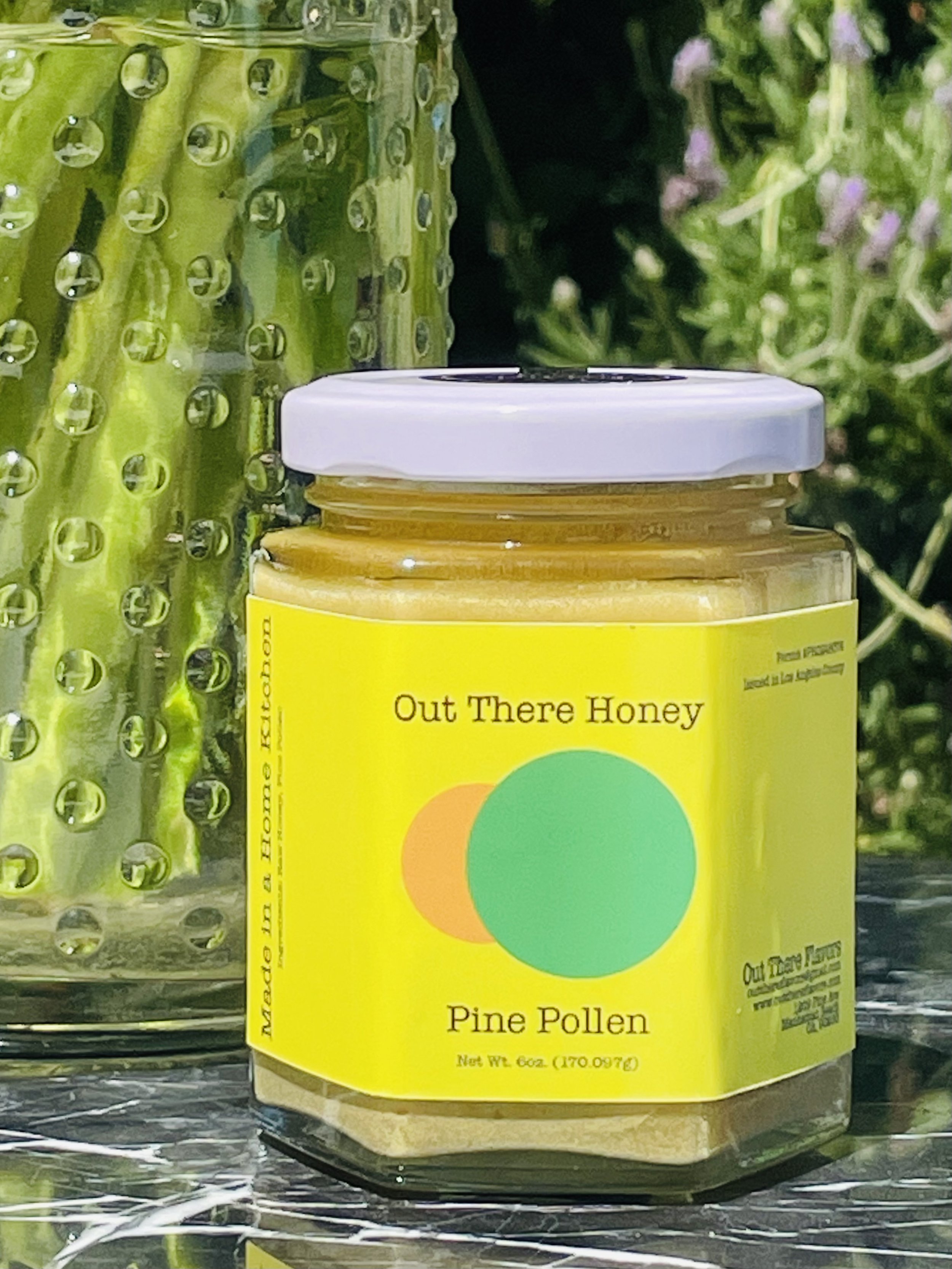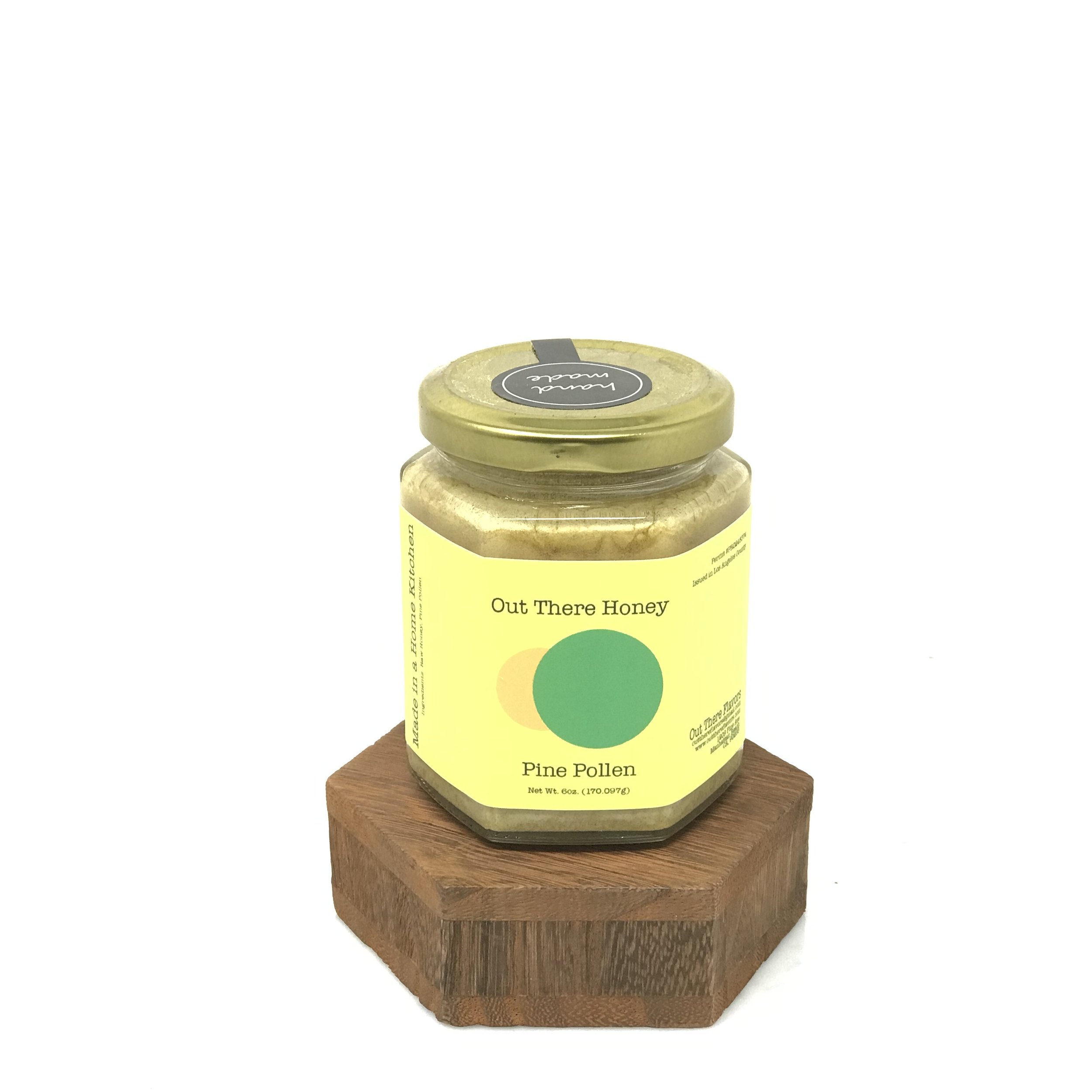


Out There Honey:Pine Pollen
Natures multi-vitamin! Mildly botanical in flavor with pollen you can see.
Note that these items are available for pre-order pick-ups & free local home delivery (on $40+ orders only & within a 10 mile radius of Manhattan Beach, CA.) Please note your delivery address at checkout.
Out There Honey:Pine Pollen
Natures multi-vitamin! Mildly botanical in flavor with pollen you can see.
Note that these items are available for pre-order pick-ups & free local home delivery (on $40+ orders only & within a 10 mile radius of Manhattan Beach, CA.) Please note your delivery address at checkout.
Did you know that pollen is sometimes used for health benefits? In fact, pollen has been identified as a component of medicines that are 2,000 years oldTrusted Source.
One type of pollen often used for health purposes is pine pollen. It’s believed that pine pollen has anti-aging properties, alleviates fatigue, and boosts testosterone.
Continue reading to find out more about pine pollen, its uses, and benefits.
What is pine pollen?
First, pollen is produced by a variety of trees, flowering plants, and grasses. It’s actually the male fertilizing component of these plants. Pollen is grainy and powdery in texture.
Pine pollen comes from a variety of species of pine tree, just a few of which include:
Masson’s pine (Pinus massoniana)
Chinese red pine (Pinus tabulaeformis)
Scots pine (Pinus sylvestris)
You can find pine pollen in a variety of dietary and health supplements. It can come in powders, capsules, or tinctures.
Benefits and uses
Pine pollen has long been used for a variety of health-related purposes, such as:
supplementing the diet or adding to foods
slowing aging
reducing fatigue
boosting testosterone
treating a variety of conditions, including colds, constipation, and prostate disease
Some of the proposed health benefits of pine pollen are anecdotal. This means they’re derived from personal testimony rather than research studies.
However, scientists have been actively investigating the potential benefits of pine pollen. Let’s see what the research says so far.
Nutritional value
Pine pollen has the following nutrients:
protein
fatty acids
carbohydrates
vitamins, such as B vitamins and vitamin E
There haven’t been studies in humans about the benefits of pine pollen as a dietary supplement.
However, a small study with pigs found that inclusion of pine pollen in their diet increased stool weight and water content. This suggests pine pollen may be a good fiber supplement.
Anti-aging
A 2012 studyTrusted Source investigated the anti-aging effects of pine pollen in cultured human cells and in mice.
Most cells, with the exception of cancer cells, can’t divide indefinitely. They can only divide a limited amount of times. This is called replicative senescence. The researchers found that pine pollen delayed replicative senescence in cultured human cells.
In mice, the researchers found that pine pollen prevented memory errors in a test of neurological activity. They also observed a rise in activity of antioxidant molecules and a decrease in molecules associated with inflammation.
Antioxidant properties
Antioxidants are compounds that can slow or stop damage to your cells done by molecules called free radicals. Since antioxidants may help prevent aging and conditions like cancer, there’s been research into the antioxidant properties of pine pollen.
One studyTrusted Source found that pine pollen extract had comparable antioxidant activity to a control antioxidant compound. The pine pollen extract also had an anti-inflammatory effect, reducing the levels molecules associated with inflammation in stimulated cells in a culture.
A recent studyTrusted Source in cultured cells and with rats found that a carbohydrate derived from pine pollen had antioxidant activity. Additionally, when challenged with a toxic compound, researchers observed that pretreating rats with the pollen-derived carbohydrate decreased both visible liver damage and the levels of enzymes associated with liver damage.
Testosterone
Testosterone has been found in the pollen of the Scots pine (Pinus sylvestris). It’s estimatedthat 10 grams of this pollen contains 0.8 micrograms of testosterone.
Because of this, pine pollen is often used to boost testosterone levels. However, there haven’t been any studies into the effectiveness of pine pollen in increasing testosterone.
Health conditions
There’s been a limited amount of research so far on how pine pollen can affect different health conditions.
One studyTrusted Source looked at pine pollen and how it affected chronic arthritis in mice. Researchers found that treatment with pine pollen extract daily for 49 days lowered arthritis symptoms in the mice. Additionally, molecules associated with inflammation were also reduced.
A 2013 study in cultured liver cancer cells found that a carbohydrate derived from pine pollen could stop the cells during their division cycle. This is intriguing since one of the hallmarks of cancer cells is that they grow and divide in an uncontrolled manner.
